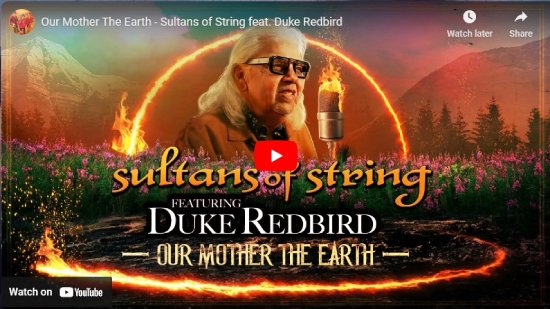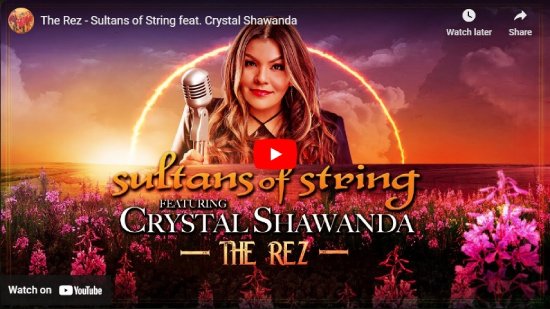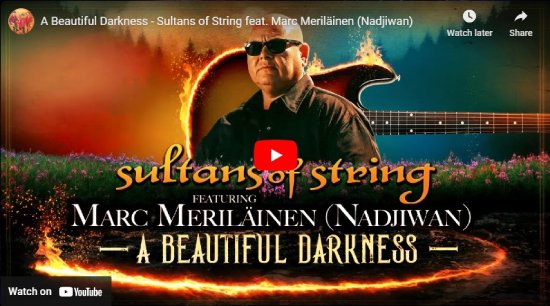Walking Through the Fire is a collaboration between Sultans of String – a multi-award-winning, three-times-JUNO-nominated, Billboard-charting, genre-hopping, global-music instrumental band – and various First Nations, Métis, and Inuit artists. Among them are Crystal Shawanda, Don Ross, Dr. Duke Redbird, Leela Gilday, Marc Meriläinen, Northern Cree, and Digging Roots.
When Sultans of String were collaborating with Redbird on the 2021 album Sanctuary – a project showcasing the positive contributions of refugees and new immigrants to Canada – Redbird asked Sultans bandleader Chris McKhool, “When are you going to do for Indigenous awareness, what you’ve done for refugees and new immigrants?” McKhool takes a beat before saying, “That was a very direct call to action.”

Select the image to play the YouTube video of the song “Our Mother The Earth” by Sultans of String featuring Duke Redbird
The newer album was recorded in the spirit of the Truth and Reconciliation Commission’s 94 Calls to Action, one of which is for Indigenous and non-Indigenous people to work together on a path forward. Sultans of String – Kevin Laliberté and Eddie Paton on guitars, Drew Birston on bass, Rosendo “Chendy” Leon on percussion, and violinist McKhool – consulted various Indigenous advisors for the project, including the aforementioned Redbird, a Grammy-nominated Elder and poet from the Saugeen First Nation.
Redbird’s musical contribution to Walking Through the Fire is his poem, “Our Mother the Earth,” recited with his characteristically resonant voice, standing tall over the music like a majestic tree. The Sultans of String are Redbird’s musical foliage, shedding their soaring sounds in support of his message, creating a synergistic effect. Surprisingly, Redbird’s poem was inspired by national anthems.
“If people included an anthem to the Earth, along with their national anthem, at every event, it would serve to acknowledge our identity, values, and sense of pride in the fact that we’re all children of the Earth,” he says in the liner notes. “The place that we have to start is with the truth. Reconciliation will come sometime in the future, perhaps, but right now, truth is where we need to begin the journey with each other.”
Truthfulness was required when Crystal Shawanda, a friend and previous collaborator of the Sultans, was invited to sing “Sweet Alberta.” Shawanda explained it wasn’t proper for her to vocally represent western Canada, given that she’s from Wiikwemkoong First Nation in Manitoulin Island, Ontario. Instead, she recommended Alberta-based duo The North Sound, featuring Blackfoot singer-songwriter Forrest Eaglespeaker. McKhool was grateful for Shawanda’s honesty and help. “To be able to do a project like this takes a whole lot of humility and patience, and a mindset of, ‘I’m going to be a listener, not a doer,’” he says. “I think it’s really important to always be there with an openness to learning.”

Select the image to play the YouTube video of the song “The Rez” by Sultans of String featuring Crystal Shawanda
Fortunately, Shawanda had a tune in her back pocket. She remembered “The Rez,” a song she’d written with Ed Hill and Shaye Smith early on in her career, when she was on tour and feeling homesick. “Sometimes people only focus on the negative sides about growing up on an Indian Reservation,” says Shawanda. “Even though I did experience some negative things, and I grew up around inter-generational trauma, I also grew up around a lot of incredible people. They showed me, by example, how to be resilient, through humor, through love, through family, through community.”
Collaboration also involves trusting others with your songs. Shawanda was surprised on recording day. “I showed up to the studio, and the song was completely different,” she says, erupting in laughter. “It was much slower than it was actually written. But I loved it. I felt like it fit their style, and what they do, and I was totally comfortable with that. I just rolled with it. It’s a collaboration.” The result is a memorable, feel-good song about Shawanda’s love for her hometown, and all her relations, sung passionately with her somewhat gritty, blues- and rock-tinged voice.
Another rock-influenced song is the album’s opening track, “A Beautiful Darkness,” written and performed by singer-songwriter Marc Meriläinen, who sometimes records under the name Nadjiwan. Meriläinen grew up in Thunder Bay, and was inspired by his hometown’s rock scene, as well as the traditional music he would hear at powwows and other community events. He’s encouraged by new generations of Indigenous musicians. “I’m impressed by a lot of the artists coming out now,” he says. “It seems like there’s a renaissance moving forward.”
Meriläinen wrote “A Beautiful Darkness” during lockdown, when he was feeling isolated. But the song is about more than busting out of our pandemic social bubbles. “Today’s society has become so polarized and isolated, and I think we all need to break out of that, “ he says. “We need to work with one another on creating solutions not just for today, but for future generations, our children, and our grandchildren. Hopefully we’re setting an example with this collaborative project.”

Select the image to play the YouTube video of the song “A Beautiful Darkness” by Sultans of String featuring Marc Meriläinen (Nadjiwan)
McKhool shares the same hope. “When someone drops the word ‘reconciliation’ into the conversation, some people get very afraid, because they don’t know what it means,” he says. “What does this mean for Canada? What does this mean for my life? What am I supposed to do?” But there’s hope and healing on the other side of walking through the fire of reconciliation.
During the summer of 2023, when there were an unprecedented number of wildfires in Canada, McKhool learned about nature and renewal from Mark Rutledge, the art director for the album, who has Ojibway and Anishinaabe roots, and hails from Little Grand Rapids First Nation. “Mark was telling me how afterwards, you could see fireweed sprouting out,” says McKhool. “That’s the flower that’s on the cover of the album. And you can see rivers and fields of this fireweed. It brings renewal to the soil, and that becomes the next generation of forest and life there.”
Walking Through the Fire demonstrates how working together can produce beautiful music, and offer hope and renewal for the next generation. Only by learning from one another, and making reparations, can we make a start on reconciliation. By centering Indigenous voices in their collaborative album – and not applying for financial support from Indigenous-funding streams – Sultans of String have tried to make that start.